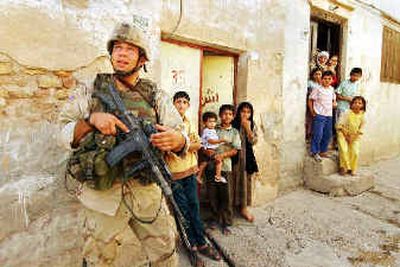Car bomb kills 16 Iraqis, wounds 30

BAGHDAD, Iraq – A suicide car bomber plowed into an Iraqi military checkpoint northwest of Baghdad on Wednesday, killing 16 Iraqis and wounding about 30, as U.S. and Iraqi forces sealed off roads south of the capital in a campaign to curb the insurgency before January’s elections.
There were hopeful signs, meanwhile, that talks may produce a cease-fire agreement with a Shiite militia headed by radical cleric Muqtada al-Sadr – although residents of his stronghold Sadr City reported explosions in the area late Wednesday. A negotiator also claimed progress in talks to end the military standoff in Fallujah – the country’s toughest insurgent stronghold and suspected base of Iraq’s most feared terrorist group.
The car bomb attack occurred about 11:15 a.m. at an Iraqi National Guard encampment near Anah, 160 miles northwest of Baghdad on the main highway to Syria. According to the U.S. military, the camp came under fire, and a few minutes later a vehicle sped to a nearby National Guard checkpoint and exploded.
Dr. Waleed Jawad Qamar of the Anah health clinic said his facility recorded 13 dead and 25 injured. Another hospital in nearby Hadithah reported three dead and five injured. U.S. officials said no Americans were killed or wounded but had no report of Iraqi casualties.
Car bombs – some piloted by suicide drivers and others detonated remotely – have become an increasing threat to multinational and Iraqi forces because insurgents find them safer than other forms of attack that can draw devastating American return fire. In September, 29 Iraqi and multinational troops were killed by car bombs, according to the U.S. command, which did not break down the figure by nationality.
U.S. and Iraqi forces are trying to restore enough control of this turbulent country so that national elections can be held in January. President Bush and Prime Minister Ayad Allawi have insisted the elections – considered a vital step toward building Iraqi democracy – must take place throughout the country, despite warnings by some U.S. military officials that balloting may not be possible in certain areas.
More than 3,000 U.S. and Iraqi forces launched a major operation Tuesday to retake control of insurgent-held parts of Babil province south of Baghdad. The operation in Babil – notorious for kidnappings and ambushes and home to ancient Babylon – followed last week’s ouster of insurgent forces from Samarra, 60 miles north of the capital.
As part of the Babil operation, American troops and Iraqi National Guardsmen on Wednesday blocked the roads leading to Qasir town in the Youssifiyah area, about 12 miles south of Baghdad. Residents said two explosions – a car bomb and a roadside bomb – hit two bridges in the area Wednesday, an apparent attempt by insurgents to bar the movement of Iraqi and U.S. forces.
Residents were divided over whether the U.S.-led operation was justified.
“The Americans want to stop the resistance, which they call terrorism, and this is wrong,” said Mohammed Fadhil, 20, of Youssifiyah. “In fact, it is a legitimate reaction to the occupation.”
But others felt the raids were needed to restore order in the region.
“I support the military operation. We should get rid of the armed groups in our area because their (the insurgents) only goal is to kill more Iraqis and to ignite civil war,” said Mohammed Hussein, 29, a farmer.
As military operations increase, Allawi’s government is accelerating moves to peacefully restore control of insurgent strongholds. Iraqi mediators said the government and followers of al-Sadr were near agreement on a deal to end weeks of clashes between American soldiers and the cleric’s militia in the Sadr City district of the capital.
Allawi told reporters there was no cease-fire so far but that a committee was being formed to discuss what he termed an “initiative” to end the conflict.
Kareem al-Bakhatti, a pro-al-Sadr tribal elder, said the framework agreement calls for al-Sadr’s militiamen to turn in their weapons in exchange for cash payments and immunity from prosecution for most of them. Iraqi police would take over security responsibilities in Sadr City and American forces would enter the district only with the approval of Iraqi authorities, he said.